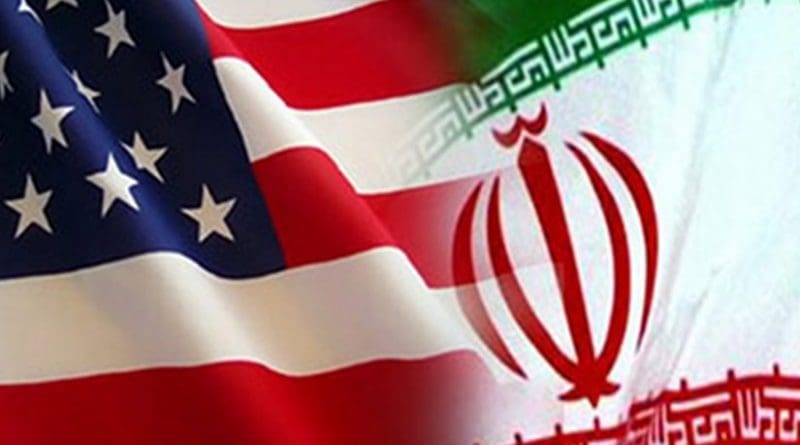Iran And America: Establishment Of Relations Or Peaceful Coexistence? – Analysis
By Iran Review
By Saeed Davar*
How relations between Iran and the United States can be changed? This has been among the most important questions with regard to Iran and the United States during about 40 past years. However, first we must see whether this change is necessary or not? Fundamental alterations in Iran during 1979 led to special developments in the Middle East. At first, Israel’s presence in the region was challenged due to Iran’s impact on political structures in many regional governments such as Lebanon, which in later years spread to Syria, Iraq, Afghanistan and the Arab states of the Persian Gulf as well.
As a result, meaningful political changes took place in Iran’s favor in this region, which increased the Islamic Republic’s influence among regional nations that span a wide geographical expanse from Pakistan to South Caucasus and littoral states of the Persian Gulf, Yemen, and even some African states.
Despite global pressures put on Iran under the leadership of the United States, the country has been able to achieve an exciting level of scientific and weapon capabilities, even in the field of nuclear technology, and has been officially recognized as such by the world’s nuclear powers. However, tensions between Iran and the United States are still far from over. At present, Iran is one of the main reasons why Syrian government has not fallen yet. It has also motivated Russia’s military presence in that Arab country. Russia’s military presence at an air base in the Iranian city of Hamedan actually humiliated Washington. In return, the United States has been the cause of most security, political and espionage problems and threats faced by Iran. Regardless of the problems that the United States has with some European countries, Russia, China and some Latin America states, it has had the most serious contention with Iran, which at times led to limited military confrontation between the two sides. As a result, the United States not only incurred losses on Iran, but also suffered serious blows from Iran, especially when it comes to humiliation of America.
Apprehension of American soldiers and impounding their boats in addition to downing or capturing US espionage aircraft have been good examples in this regard. However, such tensions cannot, and must not, continue through a logical process because both countries are able to affect many variables related to global security and energy and can have a destructive impact on the situation, taking into account that they themselves will be at loss in such a situation as well. The behavior of the two sides following the nuclear talks and the nuclear agreement known as the Joint Comprehensive Plan of Action (JCPOA) also shows that there is still a long way to go before a real thaw in the two countries’ relations. The question, however, is that do Iran and the United States have any ideal point for peaceful coexistence? Such a point can be certainly found, but the requisite to do this is to elevate the level of trust between the two countries and, before that, a change in behavior regarding mutual issues and decisions is mandatory.
Just in the same way that tensions between these two countries will create negative conditions across the region, realization of positive conditions can lead to peace and suitable changes. In line with its traditional interests following the Spanish–American War and according to the Monroe Doctrine, the United States has defined large regions of the world in accordance with its national security interests. At present, part of those regions also falls within the radius of Iran’s national interests as well, and this issue has increased friction between the two countries. In my opinion, positive changes in relations between the two countries are possible, but this issue requires certain developments, which can only take place in the course of time. There was initially no ground for official contacts between officials of Iran and the United States after the Iranian revolution in 1979, but at present, part of the measures that can complete this process have been taken and this process has even reached the two countries’ presidents. Therefore, both countries must recognize and accept each other’s interests.
Achieving this goal requires new understanding of relations. The two sides should use their capacities and show more resilience, especially with regard to management of tensions and overcoming crises, and both countries must recognize this reality. They must also avoid any behavior that may intensify suspicions. The two countries cannot ignore each other. As an Iranian, we must note that general measures taken by the United States have not helped build trust with Iran. Therefore, if the United States enters into negotiations with Cuba after 50 years of sour ties, it does not mean that 100 years must pass before reestablishment of political relations between Iran and the United States would be possible. I believe that the speed of rapprochement between the United States and Iran will be much higher due to Iran’s higher importance compared with Cuba, its geopolitical coordinates, its vast geographical expanse, the great impact it has on energy security in the Persian Gulf and the Strait of Hormoz, and its influence on major Arab countries of the region, including Iraq, Syria and even Kuwait and Saudi Arabia.
* Saeed Davar
International Analyst


Regarding your introductory question: “…first we must see whether this change [in relations between Iran and the US] is necessary or not?” I read your entire analysis to find the answer, but with little success.
As an Iranian, I don’t think we can come to terms with present-day US leaders. They are commonly short-sighted, irresponsible, greedy multi-millionaires who are grown, trained, installed, inspired, directed, and supported by AIPAC and other similar lobbies.
Peace can’t be reached with leaders who own oil and weapons factories and live only on other countries’ natural resources and on war between poor nations.